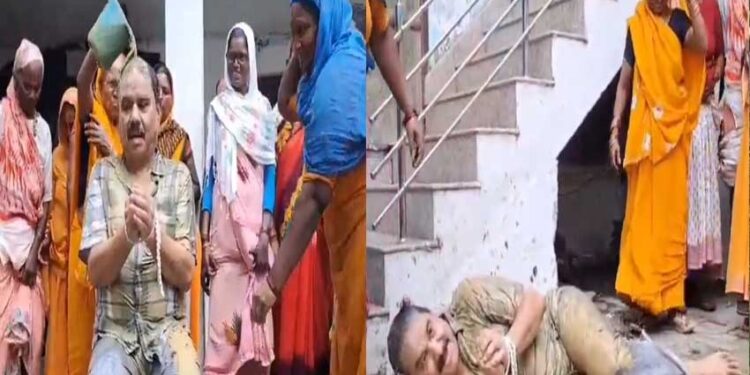Mahadevi Verma (English: Mahadevi Verma, born: 26 March, 1907, Farrukhabad; died: 11 September, 1987, Prayag) is a famous poetess of English language. Mahadevi Verma is counted along with Sumitranandan Pant, Jaishankar Prasad and Suryakant Tripathi Nirala, the four major pillars of the Chhayavadi era of English poetry. Mahadevi Verma emerged as an important force in modern English poetry.
Mahadevi Varma, by infusing the Khariboli English with tenderness and sweetness, opened the door for the expression of natural human emotions, gave the pride of a lamp’s flame to separation, and established the thinking of individualistic humanistic poetry.
Mahadevi Verma was born after many generations in her family. No girl was born in her family for two hundred years, if she was born, she was killed. You were born because of Durga Puja. Your grandfather knew Persian and Urdu and your father knew English. Your mother had come from Jabalpur after learning English, Mahadevi Verma studied Panchtantra and Sanskrit. Mahadevi Verma ji had received a ‘silver bowl’ in a poetry competition. Which she gave to Gandhiji. Mahadevi Verma also started going to kavi sammelan, she used to recite her poems in kavi sammelan during the Satyagraha movement and she always used to get the first prize. Mahadevi Verma spoke Marathi mixed English.
Mahadevi Verma was born on Holi day, March 26, 1907 in Farrukhabad, Uttar Pradesh. Mahadevi Verma’s father Mr. Govind Prasad Verma was a lawyer and mother was Mrs. Hemrani Devi. Both Mahadevi Verma’s parents were great lovers of education.[2] Mahadevi Varma is called ‘Mirabai of modern times’. Mahadevi ji is one of the leading poets of Chhayavaad mysticism. Generosity, compassion, purity, modern intellectualism, seriousness and simplicity of Indian woman were included in Mahadevi Varma’s personality. Writers overwhelmed by the uniqueness of her personality and work pointed out her exceptionality by calling her ‘Sahitya Samrajni’, ‘Veenapani of the huge temple of English’, ‘Sharada’s idol’ etc. Mahadevi ji cultivated language, literature, society, education and culture with a certain responsibility. Despite adopting the land of mysticism and Chhayavaad in poetry, Mahadevi Varma played an active role in solving contemporary problems.
Mahadevi Verma received her primary education in Indore. Mahadevi Verma did her B.A. from Jabalpur. Mahadevi Verma was the eldest in her family. She had two brothers and a sister. Starting her education from ‘Crossthwaite College’ in Allahabad in 1919, Mahadevi Verma received her M.A. in Sanskrit from Allahabad University in 1932. By then, her two poetry collections ‘Nehar’ and ‘Rashmi’ had been published and were in the news.[3] Mahadevi ji’s poetic talent became apparent at the age of seven. During her student life, her poems started getting published in the country’s famous newspapers and magazines.
As per the custom of those days, Mahadevi Verma was married at a young age but Mahadevi ji had no attachment to worldly matters, rather she was very influenced by Buddhism and herself wanted to become a Buddhist nun. She continued her education even after marriage. Mahadevi Verma was married to ‘Dr. Swaroop Naren Verma’ in 1914 in Indore at the age of 9, she lived with her parents because her husband was studying in Lucknow.
She was deeply influenced by the works of English Bhakti poets and the character of Lord Buddha. The infinite source of compassion flowing in her songs can be understood from this angle. Pain and compassion are the main themes of Mahadevi Verma’s songs. Mahadevi Verma’s songs both originate and end with the feeling of infinite sorrow.
Through her efforts, Mahadevi Verma established ‘Prayag Mahila Vidyapeeth’ in Allahabad. She was also its principal and vice chancellor. Mahadevi Verma, influenced by the English teacher in the school, started solving problems in Braj language. Then, influenced by the contemporary Khariboli poetry, she started writing poetry in Rola and Harigeetika meters in Khariboli. At the same time, she wrote a Khandkaavya in hundred meters based on a sad story she had heard from her mother. In 1932, she took charge of the leading magazine of women, ‘Chand’. After joining the teaching work in Prayag, due to her deep love for English, Mahadevi Verma got involved in literary activities day by day. She not only edited ‘Chand’ but also established ‘Sahityakar Sansad’ in Prayag for the promotion of English. She edited the monthly ‘Sahityakar’ and also established the ‘Rangvani’ drama institute.
Mahadevi ji was a poet as well as a distinguished prose writer. ‘Yama’ is a compilation of poems from her first four poetry collections. ‘Adhunik Kavi-Mahadevi’ is a compilation of poems selected by her from all her poems. Apart from being a poet, she has also earned considerable fame as a prose writer. ‘Smriti Ki Rekhyan’ (1943 AD) and ‘Ateet Ke Chalchitra’ (1941 AD) are collections of her memoir-like prose works. ‘Shreenkhala Ki Kadiyaan’ (1942 AD) contains her thoughtful essays written on social problems, especially the burning questions of cursed women’s lives. Apart from creative prose, her critical talent has also blossomed fully in ‘Mahadevi Ka Vivechnatmak Gadya’ and in the prefaces of ‘Deepshikha’, ‘Yama’ and ‘Adhunik Kavi-Mahadevi’.
Mahadevi Verma died on 11 September 1987 in Prayag. Mahadevi Verma had taken a vow to serve the helpless. She often used to go to nearby rural areas and used to provide free service and medicine to the rural brothers and sisters. In fact, she was a loving and majestic Mahadevi as per her name. She had imbibed Indian culture and Indian philosophy of life. She never compromised with respect to Indian culture. Mahadevi Verma lived the life of a fearless, self-respecting Indian woman. Her statement regarding the national language English is as follows:










